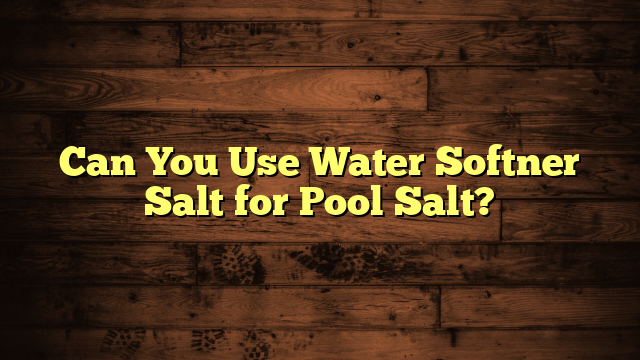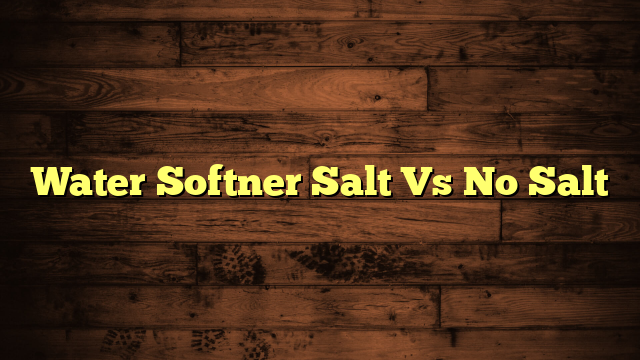Can You Use Water Softner Salt for Pool Salt?
If you've ever run out of pool salt and considered using water softener salt instead, you might want to think twice. While both salts are sodium chloride, their purity levels and intended uses differ considerably. Water softener salt can contain impurities and additives that may cloud your pool water or disrupt its chemical balance. This raises questions about how safe it is for your pool and your swimmers. So, what are the real risks involved, and how can you guarantee your pool stays in prime condition?
Key Takeaways
- Water softener salt contains impurities and additives that can disrupt pool chemistry and lead to cloudy water.
- Pool salt is specifically designed for saltwater pools, ensuring compatibility with filtration systems and efficient dissolution.
- Using water softener salt may cause scaling and maintenance issues due to harmful additives not found in pool salt.
- Regular testing is necessary, as water softener salt can alter chlorine levels and complicate pool maintenance.
- For optimal water quality and safety, always use pure sodium chloride (pool salt) instead of water softener salt.
Understanding Water Softener Salt
Understanding water softener salt is essential for maintaining your pool's water quality. When you choose the right salt types, you're not just enhancing the pool experience; you're also gaining the numerous water softener benefits.
Water softener salt typically comes in three main types: rock salt, evaporated salt, and solar salt. Each type has its pros and cons, and knowing these can help you make an informed choice.
Rock salt is the least processed and often the most affordable option, but it may contain impurities that can cloud your pool water.
Evaporated salt, on the other hand, is highly refined and contains less insoluble matter, making it a cleaner choice.
Solar salt is a middle-ground option, produced through evaporation of seawater; it's effective and usually cost-efficient.
What Is Pool Salt?
Pool salt is specifically designed for use in saltwater pools, where it plays an indispensable role in the water sanitation process. Unlike regular table salt, pool salt is usually made from evaporated sea salt or mined salt, guaranteeing it's free from additives.
When dissolved in water, it generates chlorine through a salt chlorinator, which helps keep the pool clean and safe for swimming.
When it comes to pool maintenance, using the right type of salt is vital. Pool salt is formulated to dissolve easily and work effectively with your pool's filtration system. Unlike salt alternatives, such as water softener salt, pool salt doesn't contain impurities that could harm your pool equipment or affect water balance.
Choosing the right pool salt can make a significant difference in your overall pool care routine. It guarantees that your pool stays sanitized while minimizing maintenance issues.
If you're thinking about alternatives, remember that they may not provide the same benefits. Always opt for high-quality pool salt to keep your swimming environment healthy and enjoyable.
Key Differences Between Salts
When it comes to choosing the right salt for your needs, knowing the key differences between pool salt and water softener salt is crucial. The first distinction lies in their composition.
Pool salt typically contains pure sodium chloride and is designed specifically to maintain water quality in chlorine generators, guaranteeing a clean and safe swimming environment. In contrast, water softener salt can contain additives, such as anti-caking agents, which help prevent clumping but may not be suitable for pools.
Another important factor is the salt types. Pool salt is often more refined, meaning it dissolves quickly and efficiently in water, while water softener salt may include impurities that can cloud your pool water.
In addition, the presence of these additives can lead to scaling or other issues in your pool's filtration system.
Ultimately, if you want to maintain the best water quality, it's best to stick with pool salt, which is formulated for the unique needs of pools.
Using the right type of salt not only guarantees a better swimming experience but also prolongs the life of your pool equipment.
Potential Risks of Using Softener Salt
Using water softener salt in your pool can pose significant risks that you should be aware of.
First, many types of softener salt contain contaminants that can negatively impact water quality. These contaminants may include additives, such as anti-caking agents, which aren't safe for swimming environments. If you introduce these substances into your pool, you could inadvertently create a breeding ground for bacteria or algae, leading to unclean and unsafe water.
Furthermore, using softener salt can lead to health hazards for you and your loved ones. If contaminants enter the pool water, they can irritate your skin and eyes, and in some cases, they might trigger allergic reactions.
Moreover, the chemical balance of your pool may be disrupted, which can exacerbate these health risks.
Realizing the potential consequences is essential. You want your pool to be a safe, relaxing space, free from unnecessary risks.
Instead of using softener salt, it's best to choose salt specifically designed for pools, ensuring both your health and your pool's integrity remain intact.
Effects on Pool Chemistry
Using water softener salt in your pool can greatly affect its chemistry.
The differences in chemical composition can alter chlorine levels and disrupt your water balance, leading to potential issues if not monitored closely.
Understanding these impacts is essential for maintaining a healthy and safe swimming environment.
Chemical Composition Differences
Water softener salt can significantly impact pool chemistry due to its distinct chemical composition. Unlike traditional pool salt, which is generally made of sodium chloride (NaCl), water softener salt often contains additives that can alter its chemical properties. Many water softener salts include compounds like potassium chloride or other minerals aimed at reducing hardness in water.
These salt types can introduce additional elements into your pool, potentially affecting water balance. When you add water softener salt to your pool, you're not just adding salt; you're changing the overall chemistry. The presence of these additives can interfere with the pool's pH levels and total dissolved solids (TDS).
This interference can lead to issues such as cloudy water or scaling, jeopardizing the efficiency of your pool's filtration system. Moreover, using water softener salt can compromise the effectiveness of pool chemicals, possibly leading to an imbalance in sanitizer levels.
It's vital to understand that even small variations in chemical composition can have significant consequences for your pool's health. Consequently, sticking with the appropriate pool-grade salt is important to maintaining ideal water chemistry and ensuring your pool remains clean and safe for swimming.
Impact on Chlorine Levels
The choice of salt can directly influence chlorine levels in your pool. Using water softener salt instead of pool salt can lead to issues with chlorine stability. This is primarily due to the differences in purity and chemical composition. Water softener salt may contain additives that affect how your pool's chlorine reacts and absorbs in the water.
To help you understand the potential impacts, here's a quick comparison:
| Factor | Water Softener Salt | Pool Salt |
|---|---|---|
| Purity Level | Lower | Higher |
| Chlorine Stability | Unstable | Stable |
| Salt Absorption Rate | Inconsistent | Consistent |
When you use lower-purity salt, your chlorine levels might fluctuate more than expected. This inconsistency can lead to less effective sanitization and potential algae growth. If you're aiming for a well-balanced pool, it's essential to choose the right type of salt. Remember, maintaining proper chlorine levels not only keeps your pool clean but also enhances your swimming experience. Stick with pool salt for ideal results, ensuring your pool remains a safe and enjoyable place.
Water Balance Alterations
Maintaining a balanced pool is vital for ideal water chemistry, and the type of salt you choose can greatly alter that balance. When you use water softener salt instead of pool salt, you might notice unexpected changes.
Water softener salt often contains additives that can impact your pool's pH levels, alkalinity, and calcium hardness. These alterations can lead to cloudy water and potentially damage your pool equipment over time.
Using the wrong type of salt can also affect your chlorine generation. If your salt is impure or contains impurities, it can create byproducts that interfere with your pool's sanitization process.
Additionally, if you're considering salt alternatives, it's important to verify they're specifically designed for pool use. These alternatives typically maintain the necessary mineral balance without compromising water chemistry.
To keep your pool in top shape, always check the salt type you're using. Regular testing of your pool's water chemistry will help you identify any imbalances early on.
Recommended Salt Types for Pools
When choosing salt for your pool, it's essential to take into account the chemical composition and purity levels of different salt types.
Not all salts are created equal, and the right choice can greatly affect your water balance.
Let's explore which types of salt will keep your pool in top condition while ensuring a safe and enjoyable swimming environment.
Chemical Composition Differences
Choosing the right type of salt for your pool is essential for ideal water softening. Not all salts are created equal, and the chemical composition plays a significant role in how effectively they perform.
Pool salt typically consists of sodium chloride but may vary in mineral content. Water softener salt, on the other hand, can contain additives or impurities that impact its effectiveness in a pool setting.
When you use salt in your pool, you want to minimize unwanted chemical interactions. These interactions can lead to cloudy water, scaling, or even damage to your pool equipment.
The mineral content of the salt you choose can influence these interactions, as certain minerals may react negatively with pool chemicals.
For best results, it's best to stick with pure sodium chloride designed specifically for pools. This guarantees that you'll maintain balanced water chemistry, preventing any issues that could arise from using water softener salt.
Purity Levels Consideration
It's important to contemplate purity levels when selecting salt for your pool, as this can greatly affect water quality.
Using salt that meets appropriate purity standards guarantees that you're not introducing harmful salt contaminants into your pool. While water softener salt may seem like a convenient option, it often contains additives and impurities that aren't suitable for swimming pools.
When choosing pool salt, look for products labeled as "pure" or "solar salt," as they typically have higher purity levels, usually around 99% sodium chloride.
These types of salt dissolve quickly and efficiently, minimizing debris and residues that can cloud your water or damage your equipment.
Avoid using rock salt or table salt, as they often contain additives and contaminants that can disrupt the chemical balance in your pool.
Always check the product label to confirm that it meets the necessary purity standards for pool use.
Impact on Water Balance
Understanding the impact of salt type on water balance is essential for maintaining a healthy pool environment. Using the wrong type of salt can disrupt your pool's chemistry, leading to problems that affect both water clarity and overall sanitation.
When choosing salt, always prioritize purity and compatibility with your pool system.
Here are some recommended salt types for effective pool maintenance:
- Sodium Chloride: This is the most common type of pool salt and works well with most saltwater systems.
- Solar Salt: Often harvested from evaporated seawater, it's a cost-effective option with minimal impurities.
- Evaporated Salt: This type undergoes purification, guaranteeing high purity levels, making it ideal for maintaining water balance.
- Water Softener Salt: Though tempting, avoid using this in your pool, as it often contains additives that can harm your pool system.
Maintaining water balance not only keeps your pool inviting but also extends the life of your equipment.
Regular testing and adjustments based on your salt type will help guarantee your pool remains a safe and enjoyable place for everyone.
Best Practices for Pool Maintenance
Maintaining a clean and safe pool requires consistent attention to several key tasks.
First, regular pool cleaning is vital. Skim the surface daily to remove debris, and vacuum the pool at least once a week to keep the water clear and inviting. Don't forget to brush the walls and tiles to prevent algae buildup.
Next, focus on filter maintenance. Check your filter system regularly to verify it's functioning properly. Clean or replace the filter cartridges as needed, typically every few months, depending on usage and debris levels. A clean filter not only keeps your water sparkling but also saves you money on energy costs.
Additionally, test your pool water weekly to monitor chemical levels, adjusting pH and chlorine as necessary. This helps maintain balanced water, which is important for both swimmer comfort and equipment longevity.
Lastly, consider creating a maintenance schedule to keep track of these tasks.
Making the Right Choice
When it comes to choosing the right water softener salt for your pool, you'll want to reflect on several factors that affect both the water quality and your pool's overall health.
The right salt selection is vital for effective pool maintenance and can prevent potential issues down the line.
Here are some key points to take into account:
- Purity: Opt for salt that's 99% pure or higher. Impurities can affect your pool chemistry.
- Type of Salt: Look for solar salt or evaporated salt, as these are specifically designed for pools.
- Dissolving Rate: Choose a salt that dissolves quickly to avoid cloudy water and guarantee effective sanitation.
- Cost vs. Quality: While it may be tempting to choose cheaper options, investing in quality salt can save you money on long-term maintenance.
Frequently Asked Questions
Can I Mix Water Softener Salt With Pool Salt?
You shouldn't mix water softener salt with pool salt. For effective pool maintenance, use the appropriate salt designed for pools. Different salt types can affect water chemistry, leading to potential issues with your pool's performance.
What Happens if I Use Softener Salt in a Saltwater Pool?
Using softener salt in a saltwater pool can lead to serious pool chemistry implications, as nearly 70% of pool owners report issues. These softener salt drawbacks might cause equipment damage and disrupt your water balance.
Is Water Softener Salt Cheaper Than Pool Salt?
When you look at the cost comparison between salt types, water softener salt often comes out cheaper than pool salt. However, consider the quality and suitability for your specific needs before making a purchase.
How Often Should I Check Salt Levels in My Pool?
You should check your pool's salt levels at least once a month. Regular salt testing frequency helps maintain water balance and guarantees peak performance of your saltwater system. These pool maintenance tips will keep your water sparkling clean.
Can I Use Softener Salt for Above-Ground Pools?
Imagine shimmering waters beckoning you. While softener salt might seem tempting for your above-ground pool, it's best to stick with pool-grade salt. Using the wrong type can cloud your crystal-clear oasis and disrupt balance.
Conclusion
In summary, choosing the right salt for your pool is essential for crystal-clear chemistry and carefree swimming. Softener salt, with its potential impurities, can spell trouble for your pool's purity and performance. Stick to pool salt, specifically formulated for best results, ensuring safety and satisfaction for every splash. So, savor the sunshine and swim safely by making the smart, salt-savvy choice for your pool maintenance needs!







